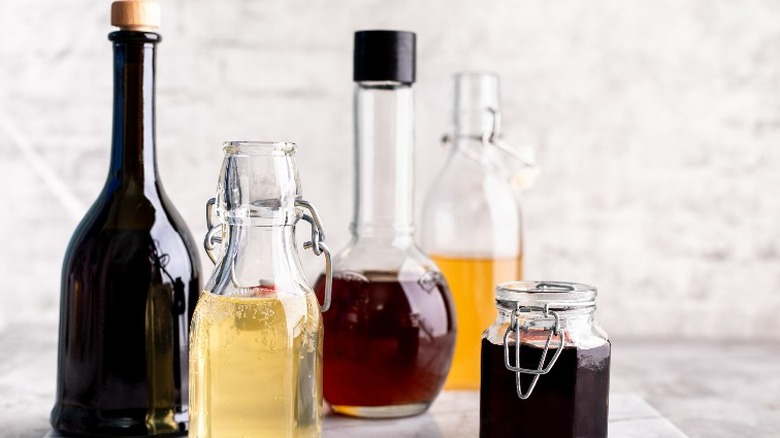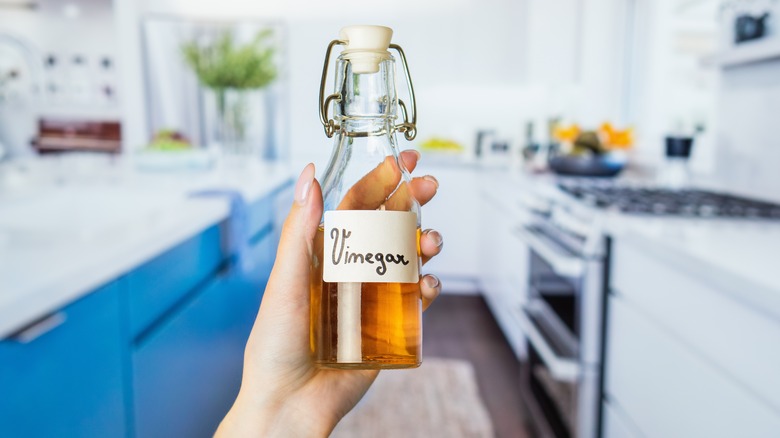The Real Reason Ina Garten Stores Vinegar In The Fridge
If you're reading a food article (like this one), there's a good chance you have at least one type of vinegar in your pantry. The word "vinegar" itself comes from the French words "vin" and "aigre," which combined translate to "sour wine" (per Organic Facts). If the name sounds less than delicious, don't be deterred: Vinegar boasts an impressive array of health benefits. It contains antioxidants, promotes stable blood sugar levels, improves heart health, and reduces acid reflux, urinary tract infections, and kidney stone formation.
In the kitchen, though, is where vinegar is a culinary superstar. This is why the Barefoot Contessa keeps a wide array of different types of vinegar on hand. "For anything I'm making, if it has like a little splash of vinegar, it just gives it an edge and wakes everything up," says celebrity chef and television personality Ina Garten, via Food & Wine. At all times, Garten reportedly keeps herself stocked with apple cider, balsamic, red white, and champagne vinegar. Although where she stores them might surprise you: Garten keeps her vinegar arsenal in the refrigerator. "I might take hell for this," the chef admits, "but I just find that they don't develop bacteria in the fridge." So, is it essential to chill them? Or will your vinegar do just fine in the pantry?
High acidity is a natural preservative
To understand how to store vinegar precisely, it's essential to know what it is. According to Britannica, vinegar is made from diluted alcoholic liquid, and then fermented. There are many different types of vinegar depending on what base they're made from including apples (think cider vinegar), grapes (red and white wine vinegar), barley (malt vinegar), and rice (rice wine vinegar), to name a few. But the common denominator, acetic acid, is what gives all of these variations that signature "vinegar smell." In fact, vinegar is often used as a preservative for other foods due to its high acidity, which prevents bacteria from growing (via Greatist). That's also why vinegar is a common ingredient in many household cleaning products (per Healthline).
Unsurprisingly, this naturally high acidity content makes for a Methusula-esque shelf life. Per WebMD, unopened apple cider vinegar has a shelf life of two years or one year after opening. If stored at room temperature away from direct light in a cabinet or the pantry, states Livestrong, your vinegar can last for years. While the bottle might be printed with an expiration or "best by" date, most types of vinegar are safe to use indefinitely, explains Eat By Date. Despite all of this, sometimes it really is best to store your vinegar in the fridge after all. So which types of vinegar need to be chilled and which ones will do just fine stashed in the pantry?
Some vinegars are more acidic than others
As MyRecipes explains, "Good vinegars are made with alcohol, and over time the exposure to the air can cause the alcohol to evaporate." For this reason, it recommends giving your vinegar a good old-fashioned taste test to determine where it should be stored. If the taste is super acidic, go ahead and pop that bottle in a cabinet. Less acidic vinegars, on the other hand won't be able to preserve themselves as sturdily and should be refrigerated to maintain flavor.
According to the home-canning guide Preserve and Pickle, distilled white vinegar has the highest acidity at around 5-10%. Red wine, white wine, and balsamic vinegars are mid-range, with 6-7% acidity. Malt, cider, and rice wine vinegars clock in lowest at around 4-5% acidity. (For reference, lemon juice contains roughly 5-6% acidity, per Chatelaine.)
Although if you start to spy some floaties in your vinegar, it might not mean it's time to pitch the bottle. If the label on your vinegar says "raw" or "unfiltered," it hasn't been heat-treated or filtered. So don't be surprised or concerned if you see a few murky-looking strings floating around in there, states WebMD. Instead, it's just the "mother" — a collection of good bacteria and a natural byproduct of fermentation. Still, if you're unsure, the tried-and-true taste test method will help you know whether or not your vinegar is ready to rock 'n roll in the kitchen.


